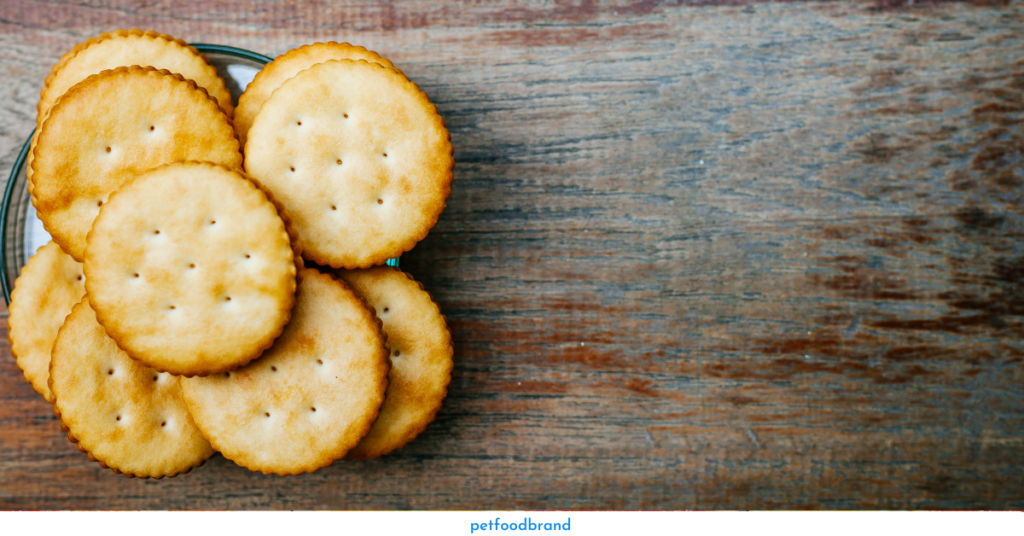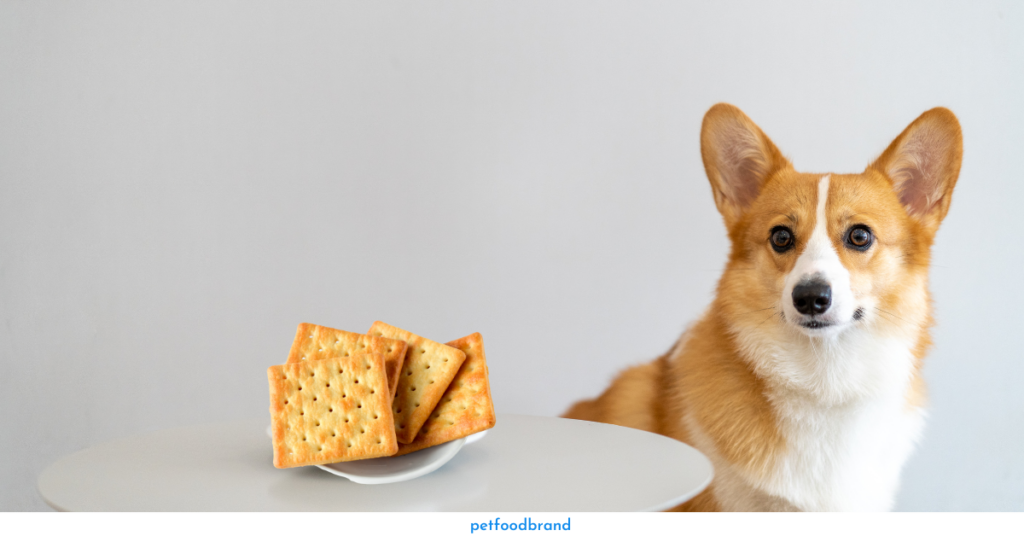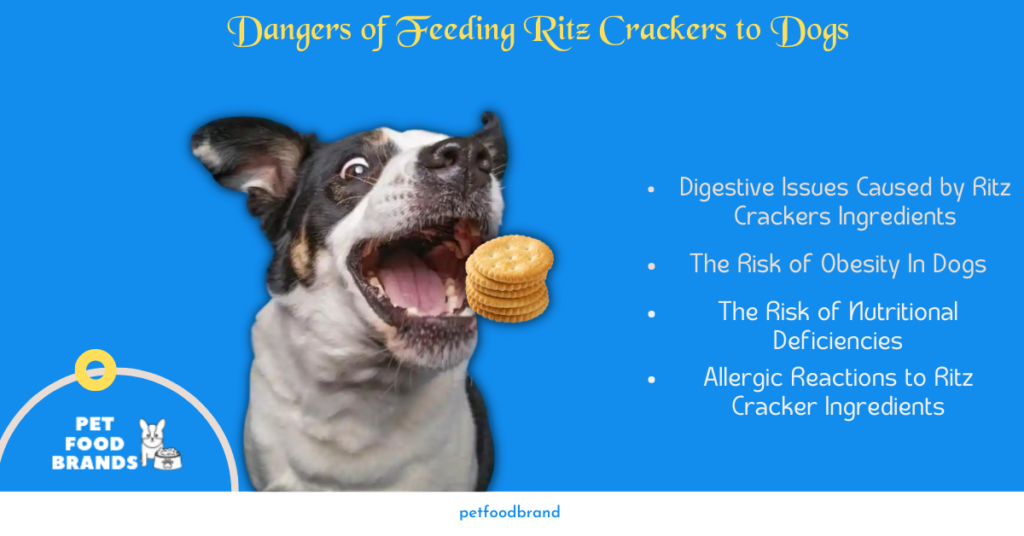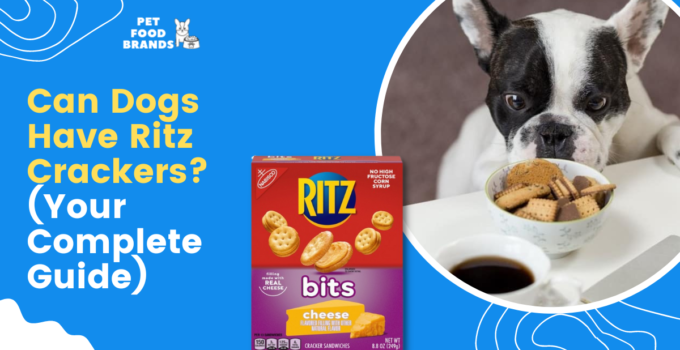Are you tired of snacking alone and wishing your furry companion could join you? Well, before you go ahead and share your beloved Ritz crackers with your dog, let’s explore whether it’s a good idea or not.
While it’s tempting to want to give your pup a taste of your favorite snack, you should be careful not to make it a habit. A small amount of Ritz Crackers won’t harm your dog, but overindulgence can lead to digestive issues, obesity, nutritional deficiencies, and even allergic reactions.
So, can dogs eat Ritz Crackers? The short answer is yes, but there are some things to consider. In this complete guide, we’ll dive into the health effects of feeding your dog Ritz Crackers and give you all the information you need to decide if it’s a suitable addition to your furry friend’s diet.
Let’s face it; dogs are always up for a treat. But before you spoil your pup with a tasty snack, let’s ensure it’s a safe and healthy choice for them.
What are Ritz Crackers Made Of?

First, let’s talk about what ingredients are included in Ritz Crackers. Here’s a look at what Ritz Crackers are made of.
Ingredients:
- Enriched Flour
- Soybean Oil
- High Fructose Corn Syrup
- Salt
- Leavening (Baking Soda, Yeast)
- Soy Lecithin
- Natural Flavor
As you can see, Ritz Crackers are made with a combination of enriched wheat flour, soybean oil, and high fructose corn syrup. The crackers are seasoned with salt, baking soda, and yeast to give them a unique flavor and texture. Additionally, natural flavor and soy lecithin are added to enhance the overall taste and quality of the crackers.
Are the Ingredients in Ritz Crackers Good for Dogs?
The ingredients in Ritz Crackers are not suitable for dogs. Ritz Crackers might be one of your go-to snacks, but unfortunately, it’s not a good idea to share them with your furry friend. The ingredients in Ritz crackers aren’t suitable for dogs and can cause digestive issues, among other problems.
For starters, Ritz Crackers often contain high fructose corn syrup, a sweetener that can be unhealthy for dogs. The processed grains, such as enriched flour, in Ritz Crackers, are also difficult for dogs to digest. Dogs are biologically relying on getting their nutrition from animal-based proteins, so relying on carbs from crackers can be detrimental to their health.
Another issue with Ritz Crackers is their high salt content. Particularly for dogs who already have illnesses like elevated blood pressure or heart problems, salt can be dangerous. Keep in mind that dogs need much less salt in their diets than humans, so it’s best to stick to treats specifically formulated for dogs.
While Ritz Crackers are low in protein, relying on them for your dog’s nutrition is not a good idea. As mentioned, dogs need a diet based on animal proteins, so treats should be just that: treats.
Can Dogs Eat Ritz Crackers?

Yes. If the amount is little, your dogs can have Ritz Crackers as treats. However, they shouldn’t have them as a regular part of their diet. The safest crackers for dogs are simple varieties without additives or excessive sugar, salt, or fat.
Despite not being toxic to dogs, Ritz Crackers lack essential nutritional components. As a result, they lack the nutrients required to maintain a nutritious diet and have additives that might harm dogs.
In addition, some ingredients in Ritz Crackers, such as high fructose corn syrup and enriched flour, can cause digestive issues in dogs, contribute to weight gain, and lead to nutritional deficiencies.
It’s best to avoid feeding dogs human food and instead provide them with a balanced and nutritious diet specifically formulated for their dietary needs.
The Dangers of Feeding Ritz Crackers to Dogs

Feeding your dog, Ritz Crackers can be harmful and carry potential risks. Some of the potential risks include the following:
1. Digestive Issues Caused by Ritz Crackers Ingredients
Many of the ingredients in Ritz Crackers, such as high fructose corn syrup and enriched flour, can cause digestive issues in dogs, leading to an upset stomach, vomiting, and diarrhea.
High fructose corn syrup is a sugar commonly used in processed foods and is known to cause digestive upset in dogs. Enriched flour, on the other hand, is a processed wheat flour that lacks the essential nutrients that dogs need to maintain a healthy diet. Combined, these two ingredients can significantly strain a dog’s digestive system, leading to discomfort and various digestive problems.
Furthermore, the high salt levels in Ritz Crackers can also cause digestive issues in dogs. Salt can cause dehydration and imbalance in a dog’s electrolytes, which are essential for proper body function.
2. The Risk of Obesity In Dogs
Ritz crackers can make dogs gain weight and become obese. The main culprits in Ritz Crackers are high fructose corn syrup and processed grains like enriched flour, which are high in calories and can cause dogs to gain weight.
Obesity in dogs can lead to various health problems, including joint problems, respiratory difficulties, and an increased risk of chronic diseases. Furthermore, obesity can also decrease a dog’s lifespan and reduce its overall quality of life.
It’s important to be mindful of the calories in the foods you feed your dog and to understand the potential health risks associated with feeding them Ritz Crackers and other high-calorie human foods.
If your dog is overweight or obese, it’s best to discontinue feeding them Ritz Crackers and consult a veterinarian for a healthy weight loss plan.
3. The Risk of Nutritional Deficiencies
Sadly, many human foods like Ritz Crackers don’t contain the nutrients dogs need to eat a balanced diet. Ritz Crackers don’t actually offer much in the way of nourishment for dogs.
Dogs have specific nutritional requirements, and it’s important to ensure that their diets are formulated to meet these needs. A diet deficient in essential nutrients can lead to various health problems, including muscle weakness, stunted growth, and decreased immunity.
In conclusion, Ritz Crackers and other human foods should be fed to dogs in moderation and as a supplement to a balanced and nutritious diet.
4. Allergic Reactions to Ritz Cracker Ingredients
Some dogs can have allergic reactions to certain ingredients in Ritz Crackers, such as wheat flour and soy. These allergic reactions can result in various symptoms, including skin irritation, digestive upset, and other health problems.
When dogs are allergic to a certain ingredient, their body overreacts to the allergen and produces an immune response. This immune response can cause symptoms ranging from mild skin irritation to more severe digestive issues. An allergic reaction may potentially be fatal in some circumstances.
Following the consumption of Ritz Crackers or any other human food, it’s important to watch out for any allergic response symptoms in your dog.
Common food allergy symptoms in dogs include itching, red and irritated skin, gastrointestinal upset, and vomiting. Ritz Crackers shouldn’t be given to your dog if you observe any of these signs. Instead, you should get him checked out by a vet right away.
In conclusion, avoiding feeding your dog Ritz Crackers and other human food is best to minimize the risk of an allergic reaction.
The best course of action is to seek the advice of a veterinarian if you have questions about your dog’s diet or think it could have a food allergy.
Healthy Snacks For Dogs Similar To Ritz Crackers
While Ritz Crackers may not be the best choice for your furry friend, plenty of other healthy snacks can satisfy their craving for something crunchy. Here are some of the best options to consider:
1. Carrots
Carrots are a great low-calorie snack for dogs that can provide them with important vitamins and minerals. Not only do they have a satisfying crunch, but they’re also a good source of fiber that can aid digestion.
2. Apples
Like carrots, apples are a crunchy snack that’s also packed with nutrients. They’re high in fiber, vitamin C, and antioxidants, making them a great choice for a healthy treat. However, removing the seeds and core before giving them to your dog is important.
3. Green Beans
Another calorie-light snack dogs may enjoy green beans. They’re high in fiber and can provide your furry friend with important vitamins and minerals like vitamin C and potassium.
4. Sweet Potato
Sweet potatoes are not only crunchy but also loaded with important nutrients like beta-carotene, vitamin C, and potassium. Sliced and baked sweet potatoes make for a great healthy treat that can satisfy your dog’s need for something crunchy.
5. Cheerios
While not as nutritious as some of the other options on this list, Cheerios can be a good alternative to Ritz Crackers when it comes to crunchiness. They’re low in sugar and salt, so they won’t harm your dog if given in moderation.
6. Air-Popped Popcorn
Plain air-popped popcorn is a great low-calorie snack that can provide your furry friend with a satisfying crunch. Just make sure to avoid popcorn with added butter or salt, which can be harmful to dogs.
When choosing snacks for your dog, it’s important to keep their overall health and nutritional needs in mind. Make sure to avoid treats that are high in sugar, salt, or fat, and always give treats in moderation.
Conclusion
Well, well, it seems that our furry friends can indeed indulge in some Ritz Crackers from time to time, but let’s not get too carried away. While a small amount won’t do any harm, it’s essential to remember that these crackers are not exactly the epitome of a balanced and healthy diet for our pups.
If your dog starts to consume too many Ritz Crackers, the high levels of salt and carbohydrates could lead to stomach disorders and even the dreaded “O” word (yes, we’re talking about obesity).
So, next time you’re reaching for your Ritz Crackers, remember that your dog’s nutrition needs are different from yours. Instead of feeding them human food, give them a balanced and healthy diet tailored specifically to their needs.
But, if you can’t resist those buttery, flaky crackers and want to share them with your furry companion, make sure to chop them up into tiny bits and feed them in moderation. After all, the ideal snack for a dog should provide them with the essential nutrition they require to stay happy and healthy.
And, as always, it’s best to consult your veterinarian for your pet’s ideal eating plan.
FAQ’s
Can Ritz crackers be a part of my dog’s regular diet?
No, Ritz Crackers should not be a regular part of your dog’s diet. While a small amount as an occasional treat is fine, offering your dog a balanced and nutritious diet specifically formulated for their dietary needs is important.
How many Ritz Crackers can I give my dog?
It’s recommended to limit your dog’s intake of Ritz Crackers to one or two crackers at a time and only offer them as an occasional treat.
What are the ingredients in Ritz Crackers that might be harmful to dogs?
The primary ingredients in Ritz Crackers include enriched wheat flour, vegetable oil, sugar, salt, and leavening agents. At the same time, these ingredients are generally safe for dogs to consume in small amounts. Ritz Crackers may also contain artificial flavors, colors, and preservatives that could be harmful to some dogs.
How much salt is in Ritz Crackers, and is it harmful to dogs?
Ritz Crackers are relatively high in salt, with around 140 milligrams of sodium per serving (5 crackers). While a small amount of salt is essential for dogs’ health, excessive amounts can lead to health problems, such as high blood pressure, dehydration, and kidney damage.
Feeding your dog too many Ritz Crackers can contribute to their overall sodium intake and increase the risk of these issues.
What are the signs of an upset stomach in dogs after eating Ritz Crackers?
The signs of an upset stomach in dogs after eating Ritz Crackers can include vomiting, diarrhea, constipation, loss of appetite, lethargy, and abdominal pain. If you notice any of these symptoms in your dog after they’ve consumed Ritz Crackers, it’s best to stop feeding them this snack and consult with your veterinarian to ensure their health and well-being.
Can puppies eat Ritz Crackers, or is it only for adult dogs?
While puppies may be able to eat a small amount of Ritz Crackers, it’s generally not recommended to include them in their diet. Puppies have different nutritional requirements than adult dogs, and their digestive systems are still developing.
Young puppies have smaller stomachs and may be unable to handle large amounts of food or treats. It’s best to stick to puppy-specific food and treats that are specially formulated to meet their nutritional needs.

Ankita is a passionate pet lover and head of content at Pet Food Brands. With her extensive knowledge and research, she provides pet owners with top-quality information on dog food and nutrition. Her dedication to improving the lives of dogs makes her a leading voice in the industry.




